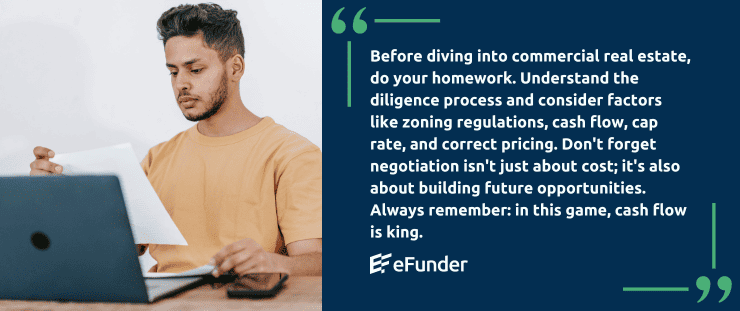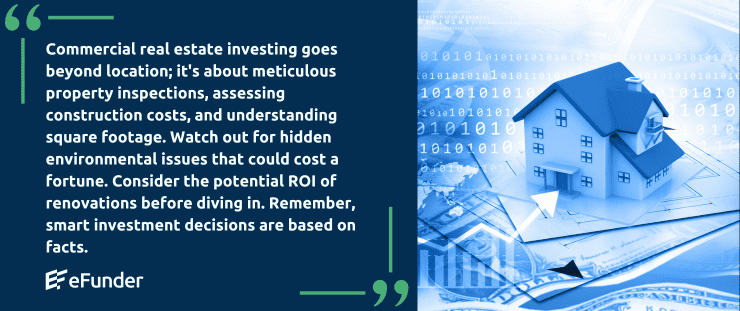- 1. Determine What Your Goals Are
- 2. Seek a Financing LOI (Letter of Intent)
- 3. Team Up With an Experienced Commercial Real Estate Broker
- 4. Begin Your Search
- 5. Check the Zoning Regulations
- 6. Assess the Property
- 7. Value the Property
- 8. Make an Offer
- 9. Do Your Due Diligence
- FAQs in Relation to Commercial Real Estate Checklist
- 1. What is a due diligence checklist in real estate?
- 2. What are the four major types of commercial real estate in order of sophistication from least to most?
- 3. What questions should you ask when buying a commercial property?
- 4. How do you analyze a commercial real estate property?
- 5. Maximize Your Commercial Real Estate Investments with the eFunder Checklist!
- Conclusion
Are you considering buying a commercial property but feeling overwhelmed by the process? You’re not alone. Many investors and business owners face this challenge. Having a well-structured commercial real estate checklist can make all the difference.
In this guide, we’ll walk you through each essential step, from setting your goals to closing the deal. I’ve got you covered. By the end, you’ll feel confident and prepared to make a smart investment. Read on to learn everything you need to know to navigate the commercial property buying journey successfully.
1. Determine What Your Goals Are
First things first, why do you want to buy a commercial property? Are you looking for a space for your business, or is this an investment to generate rental income? Knowing your goals will shape your entire approach. Define what success looks like for you. Do you want steady cash flow, long-term appreciation, or a space to grow your business? Once you’re clear on your goals, the rest of the process becomes much more manageable.

2. Seek a Financing LOI (Letter of Intent)
Before you start looking at properties, get your financing in order. A financing LOI from a lender shows sellers you’re serious and have the backing to proceed. This step can save time and help you focus on properties within your budget. Talk to different lenders to understand your options and secure the best terms. Knowing your financing limits will also help you negotiate better deals and save time on properties you can’t afford.
3. Team Up With an Experienced Commercial Real Estate Broker
Navigating the commercial real estate market can be tricky, but you can do it with others—partner with an experienced broker who knows the market inside out. A good broker will help you find suitable properties, negotiate the best deals, and avoid common pitfalls. They can be your guide and advocate throughout the process. Make sure to choose a broker with a strong track record for the type of property you’re interested in and who understands your specific needs and goals.
4. Begin Your Search
Now, it’s time to start looking at properties. This is where the fun begins! Remember your goals and consider critical factors like location, accessibility, and visibility. Make a list of must-haves and nice-to-haves. Visit multiple properties to get a feel for what’s available and how each stacks up against your criteria. Take your time during this phase, and don’t rush your decision. The right property should check all the boxes on your checklist.

5. Check the Zoning Regulations
Before you get too attached to a property, check the zoning regulations. Zoning laws dictate how a property can be used and can significantly impact your plans. Make sure the property’s zoning aligns with your intended use. If you’re unsure, your real estate broker or attorney can help you navigate these rules. Understanding zoning laws will prevent future legal issues and ensure your business or investment plans can proceed smoothly.
6. Assess the Property
A thorough property assessment is crucial. This means inspecting the structural integrity, electrical systems, plumbing, and HVAC. Don’t skip this step. Hire professionals to conduct these inspections to avoid costly surprises later. Knowing the property’s condition will help you negotiate repairs or adjustments to the price. A detailed assessment can also reveal the potential for improvements or expansions, adding value to your investment.
7. Value the Property
Determine the property’s market value. Look at comparable sales, rental income potential, and overall ROI. Perform a detailed cash flow analysis. This step will ensure you’re paying a fair price and help you forecast your potential earnings from the property. Consider using professional appraisers or financial advisors to get an accurate valuation. A well-valued property is vital to a successful investment and long-term profitability.
8. Make an Offer
Once you’ve found the right property, it’s time to make an offer. Prepare a competitive offer that reflects the market value and your financial analysis. Be ready to negotiate terms and contingencies. Your broker will be invaluable here, guiding you through the negotiation process to secure the best deal. Clearly outline your terms, such as the purchase price, deposit amount, due diligence period, and closing date.
9. Do Your Due Diligence
Due diligence is your final safety net before closing the deal. Review all property documentation, including title deeds, leases, and financial records. Conduct environmental assessments and any final inspections. This is your last chance to uncover any issues affecting your investment. Pay close attention to details, and don’t hesitate to ask for clarification or additional information. Proper due diligence ensures that there are no hidden surprises and that you’re making an informed decision.

FAQs in Relation to Commercial Real Estate Checklist
1. What is a due diligence checklist in real estate?
A due diligence checklist covers the essential steps and documents to review before buying property. It ensures all legal, financial, and physical aspects are sound.
2. What are the four major types of commercial real estate in order of sophistication from least to most?
The list ascends as follows: industrial properties, retail spaces, office buildings, then multifamily apartments or high-rise condos.
3. What questions should you ask when buying a commercial property?
You need to ask about price points, zoning regulations, cash flow expectations and potential for appreciation. Always verify building conditions too.
4. How do you analyze a commercial real estate property?
Analyze by studying location details like market trends; check cap rates; evaluate vacancy stats; assess operating expenses plus possible renovations needed. Then compare against similar properties.
5. Maximize Your Commercial Real Estate Investments with the eFunder Checklist!
Looking to invest in commercial real estate properties? Our eFunder Commercial Real Estate Checklist Template is your ultimate guide! This comprehensive checklist empowers investors to navigate every step of the investment process confidently.
Benefits:
- Streamlined Evaluation: Easily evaluate potential properties with a structured checklist covering location analysis, financial assessment, due diligence, closing processes, risk management, and ongoing management.
- Comprehensive Guidance: Ensure no crucial aspect is overlooked with detailed descriptions of each checklist item, guiding you through the complexities of commercial real estate investing.
- Risk Mitigation: Identify and mitigate risks through thorough due diligence and risk management strategies outlined in the checklist.
- Optimized Decision-Making: Make informed investment decisions backed by market analysis, ROI calculations, and clear exit strategies.
Ready to kickstart your commercial real estate investment journey? Download our eFunder Commercial Real Estate Checklist Template today and take the first step towards financial success!

Invest with Confidence. Explore eFunder’s Loan Programs and Book Your Free Consultation Today!
Don’t let financing hurdles stop you—step into a brighter future with eFunder. Our seasoned experts are here to help you achieve your investment goals. Schedule a FREE Consultation now!
Conclusion
Buying a commercial property doesn’t have to be daunting. With a clear checklist and the right team, you can navigate the process smoothly and make a sound investment. Follow these steps to ensure you’re prepared and confident every step of the way. Are you ready to take the plunge? Let’s get started! By following this guide, you’ll be well-equipped to find and secure the perfect commercial property, ensuring your investment is profitable and aligned with your goals.
Take the first step towards transforming your real estate dreams into reality with eFunder. Click here to schedule a personalized consultation and discover how we can help you secure the optimal financing for your next investment venture. Let’s build your success story together!




